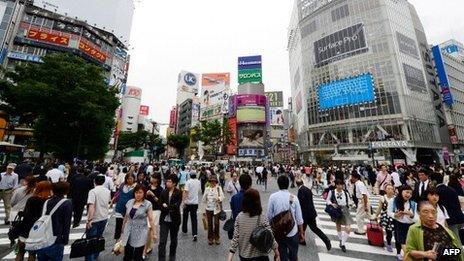Japan's economic growth revised down
- Published

Japan has taken a series of steps to revive domestic demand to boost growth
Japan has revised down its growth data for the July-to-September period, after private investment slowed more than expected.
The government said the economy grew 0.3% during the period, down from its initial estimate of 0.5% expansion.
The revised number translates into an annualised growth rate of 1.1%, down from the initial reading of 1.9%.
Japan has unveiled a series of aggressive measures to try to revive the economy after years of stagnation.
Analysts said the steps had started to have a positive impact on the economy and it was likely to pick up the pace in the coming quarters despite the downward revision to latest numbers.
"There are already signs that exports and capital expenditure are recovering, so I am not pessimistic about the outlook," said Yasuo Yamamoto, senior economist at Mizuho Research Institute in Tokyo.
"Economic growth should start accelerating again in the fourth quarter as domestic demand strengthens before the sales tax increase."
Tax concerns
In October, Japan's Prime Minister Shinzo Abe said his government will raise the rate of sales tax to 8% from 1 April next year, from 5%.
Policymakers have argued that the increase is needed to help reduce Japan's public debt - which now stands as around 230% of its gross domestic product (GDP) - and is the highest among industrialised nations.
However, there have been concerns that such a move may hurt domestic demand.
In an attempt to allay those fears, and to cushion the impact of the tax rise, the government approved a 5.5 trillion yen ($54bn; £30bn) stimulus package last week.
Analysts said the move will neutralise any impact of the tax hike.
"The government is putting as much money into the economy through this package, and through additional spending, as the increased sales tax will put out," Martin Schulz of Fujitsu Research Institute in Tokyo told the BBC.
"That means growth in the coming quarters will be stable and the hike will have no lasting impact on growth in 2014."
The latest package follows a series of other aggressive move announced over the past year aimed at reviving Japan's economy.
These steps include doubling the country's money supply and plans to boost government spending on infrastructure.
- Published20 November 2013
- Published28 November 2013
- Published14 November 2013
- Published19 July 2013